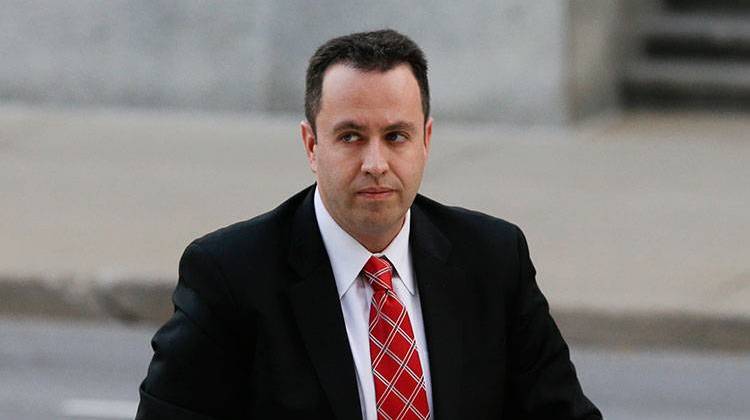
Former Subway pitchman Jared Fogle arrives at the federal courthouse in Indianapolis, Thursday, Nov. 19, 2015.
AP Photo/Michael ConroyINDIANAPOLIS -- The former face of the Subway sandwich chain will spend more than 15 years in federal prison, ending what was a long-running public persona for Jared Fogle, "The Subway Guy."
His fall from pop icon status concluded in a packed federal courtroom in Indianapolis Thursday afternoon, as he was sentenced to prison for distribution and receipt of child pornography and travel to engage in illicit sexual conduct with a minor.
The 15.5 year jail sentence, handed down by Federal Judge Tanya Walton Pratt, was three years longer than the prosecution had requested, and eight years more than the defense's request. While explaining the sentence from the bench, Pratt said she considered the need for the sentence to reflect the seriousness of the crimes and serve as a deterrent.
"The level of perversion and lawlessness exhibited by Mr. Fogle is extreme,” Pratt said.
Pratt also said the longer sentence would also give Fogle more time to participate in a sex offender treatment program while in prison. She "strongly recommending" he be sent to a federal prison in Littleton, Colorado because of its treatment facilities.
"What a gift, to have such a professional windfall fall in your lap," Pratt said, referring to Fogle's rise from obsurity to TV ad star. But she said Fogle had been living a double life.
After prison, Fogle, 38, will be on lifetime parole and registered as a sex offender. He will also be prohibited from working with groups that allow alone time with children; and the use of his cell phone and computers will be monitored electronically.
Fogle paid a total of $1.4 million in restitution to his victims. Pratt said that the plea agreement does not prohibit the victims from seeking more restitution.
Before the sentencing, Fogle read a six-minute long statement during the hearing, saying his life had spun out of control with alcohol, pornography and sex.
"I take full responsibility for the harm I've caused," he said.
"I had become dependent on alcohol, pornography and prostitutes," he told the judge. "... I want to redeem my life. I want to become a good, decent person. I want to rebuild my life."
Assistant U.S. Attorney Steven DeBrota had asked Pratt to lock Fogle up for 12.5 years, the maximum amount of prison time he’d agreed to seek under a deal with Fogle.
In his closing argument, DeBrota said Fogle knew who his victims were, where they were and realized what was going to happen to them.
"He can't control his demons," DeBrota said. "I hope he can some day.”
Fogle’s defense countered that the longer prison times sought by federal prosecutors for child sex crimes are the result of politics and hurt the rehabilitation of offenders. The defense argued that Fogle’s attempts to seek medical treatment and pay restitution should warrant he only serve the federal minimum of five years behind the bars.
"As long as it took, he realized 'I'm sick. I'm going down. I'd like to get it right,'" defense attorney Jeremy Margolis said in closing arguments.
Fogle is ready for prison and has "lost his wife, he's lost the children he loved and he's not going to see them for years and years and years," Margolis said.
Several people wrote letters to Judge Pratt in the weeks before the sentencing, asking her to not go easy on Fogle.
Fogle’s lawyers called John Bradford, a forensic psychiatrist, to testify at Thursday’s hearing.
Speaking by phone, Bradford said he analyzed Fogle two days before he was charged and concluded that Fogle suffers from hypersexuality, mild pedophilia, and substance abuse.
Under cross-examination, Bradford said Fogle admitted to paying a minimum of about $12,000 a year for sex.
“He started viewing pornography in college and had a fairly extensive collection of pornography in college,” Bradford said.
Bradford said Fogle apparently had a compulsive eating disorder before he lost all of the weight that led to him becoming the face of Subway, and that his hypersexuality seemed to develop shortly after he shed the extra pounds.
Fogle gained fame from an Indiana University student newspaper article telling how he lost more than 200 pounds his senior year thanks to exercise and a diet centered around Subway sandwiches.
The restaurant chain learned about the accomplishment and made him the center of an ad campaign that stretched on for more than a decade and helped Subway triple its number of chain locations.
He starred in numerous television spots and gave public speeches, often toting along the gigantic jeans he once wore. He’d later form a foundation with a mission of teaching children about healthy eating and weight management.
But that came crashing down over the summer, when Fogle’s home was raided and Subway quickly severed ties with their former pitchman.
The criminal case against Fogle began when Indiana State Police received a tip about the man running Fogle's foundation, Russell Taylor. An April raid on Taylor's home uncovered he'd secretly videotaped several young boys and girls bathing and changing in Taylor's home, prosecutors say.
Authorities also found messages Taylor had sent to Fogle discussing the filming of the children and images Taylor sent to Fogle. Taylor is facing separate child pornography charges, which he pleaded guilty to, and is scheduled to be sentenced on Dec. 10.
Fogle’s Zionsville home was raided in the early daylight hours of July 7 by state and federal investigators. They combed through data on 21 cell phones, 12 computers, six external hard drives, 10 flash drives, as well as cameras and CDs. They also read through tens of thousands of text messages and emails.
Fogle’s involvement in illicit sexual activity began in 2007, prosecutors said, before Fogle met and hired Taylor. He spoke to several women then about his attraction to young girls and his desire to have sex with them, court documents say. Some of those conversations were recorded and given to investigators.
After Fogle contracted Taylor to run The Jared Foundation, he began in March 2011 receiving nude child images Taylor was making. Fogle chose to benefit from the knowledge Taylor was making child pornography instead of stopping it, prosecutors say. Fogle further shared those images at least one, investigators said.
Fogle also had sex with at least one minor while traveling out of state for business.
In November 2012, prosecutors alledge, Fogle traveled to the Plaza Hotel in New York City, where he paid for sex with a 17-year-old girl. A few weeks later, Fogle requested the girl find other girls for Fogle to have sex with, allegedly stating “the younger, the better,” and asked her to send him nude images.
Fogle is accused of returning to New York City in January 2013 to again pay for sex with the same 17-year-old girl, this time while staying at the Ritz Carlton Hotel. He also paid for sex with a 16-year-old. And Fogle expressed interest in having sex with young boys, though there's no evidence he did.
Fogle first appeared in court on Aug. 19, a short hearing where he was charged and placed on house arrest. Fogle left the courthouse that afternoon to a crush of media and curious onlookers. He’d remained out of sight until today.
Fogle’s apologized through his attorney after that hearing and expressed remorse. Defense attorney Jeremy Margolis said Fogle understands he’s done wrong and ruined the lives of several children. Fogle volunteered to pay a total of $1.4 million in restitution to 14 identified victims that Fogle either had contact with or were taped by Taylor.
Since the July raid, Fogle received accelerated outpatient care for hebephilia and attended Sex Addicts Anonymous meetings in Indianapolis.
Fogle has two children and was married at the time of his arrest, though his wife has since filed for divorce. Fogle “deeply hurt” and “betrayed the trust of his family,” Margolis said, who added earning back that trust is a top priority of Fogle’s.
Fogle has a right to appeal his sentence, though not the conviction, on the grounds it is excessively harsh. He did not do so immediately, but indicated he would consult with his attorneys. He has 14 days to file an appeal.
Fogle was remanded into federal custody immediately following the hearing.
WFYI's Doug Jaggers and Deron Molen, as well as the Associated Press, contributed to this report.
Contact Ryan: (317) 489-4491 | rdelaney@wfyi.org | @rpatrickdelaney
 DONATE
DONATE





 View More Articles
View More Articles


 Support WFYI. We can't do it without you.
Support WFYI. We can't do it without you.